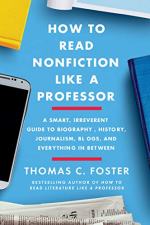
|
| Name: _________________________ | Period: ___________________ |
This test consists of 15 multiple choice questions and 5 short answer questions.
Multiple Choice Questions
1. In Chapter 13, "On the Stump," Foster refers to White House staff as "denizens" (190). What is the best definition of this word in this context?
(a) Children.
(b) Occupants.
(c) Horrors.
(d) Caretakers.
2. In "Interrogating the Text," Foster says that he himself tends to "eschew" notes. He is saying what about his use of notes?
(a) He does not use them.
(b) His notes are sometimes disorganized.
(c) He backs up his notes with a Works Cited section.
(d) He tends to provide too many.
3. In Chapter 10, "From the Inside Out," what document does Foster call the "ultimate political expression of [the] Enlightenment insistence on the individual" (146)?
(a) A Room of One's Own.
(b) The Declaration of Independence.
(c) Essay Concerning Human Understanding.
(d) Apologia Pro Vita Sua.
4. Based on Chapter 14, "The Universe of Ideas/Ideas of the Universe," what would Foster call a journalist writing a general survey of the field of string theory?
(a) Expert testimony.
(b) Interrogation of text.
(c) Amateur profiles.
(d) Journalistic compilation.
5. In Chapter 10, "From the Inside Out," what important characteristic of the essay does Foster point out?
(a) It is an ancient form of writing.
(b) It teaches the reader to organize their thoughts.
(c) It is highly adaptable.
(d) It is more easily understood than other forms of nonfiction.
6. In Chapter 10, "From the Inside Out," Foster says that the placement of newspaper columns often creates a "dichotomy." What is he accusing them of doing?
(a) Making it difficult for readers to understand the nuances of their arguments.
(b) Making it difficult for readers to find information outside of the two-party system.
(c) Creating the impression that fair and balanced coverage is unimportant.
(d) Creating the impression that there are only two possible points of view.
7. In Chapter 13, "On the Stump," Foster says that Omarosa "uses her first name mononymously" (188). What does this mean about her use of her first name?
(a) She uses it alone, as a one-word name, without her last name.
(b) She uses a nickname as her first name, but it is not her legal first name.
(c) She uses it for professional work, but it is not her real first name.
(d) She uses her last (family) name as her first (personal) name.
8. In "Interrogating the Text," what does Foster say most authors will do?
(a) Make it clear what their sources are.
(b) Try to get away with unsupported assertions.
(c) Make up sources and say that people spoke "on background."
(d) Craft arguments with a sympathetic audience in mind.
9. In Chapter 13, "On the Stump," Foster says that the outsider exposé has what advantage over the insider exposé?
(a) Perspective.
(b) Objectivity.
(c) Immediacy.
(d) Accuracy.
10. Based on Chapter 14, "The Universe of Ideas/Ideas of the Universe," what would Foster call a journalist writing about a biologist and her discoveries?
(a) Interrogation of text.
(b) Expert testimony.
(c) Amateur profiles.
(d) Journalistic compilation.
11. Chapter 15, "Reading Internet Sources," ends with the date of singer Roy Orbison's birthday. What is Foster's purpose in placing this piece of information here?
(a) To create humor.
(b) To create suspense.
(c) To offer support for his criticism of Wikipedia.
(d) To illustrate his point about trust.
12. In Chapter 9, "Living the News," what does Foster say is responsible for Didion's characteristic style?
(a) Politics.
(b) Gender.
(c) Education.
(d) Drugs.
13. In Chapter 12, "Life from the Inside," what does Foster suggest that Ambrose loses by choosing to focus on Lewis?
(a) Information about what happened after Lewis's death.
(b) The reader's trust.
(c) A variety of perspectives.
(d) The chance to engage a wider audience of readers.
14. In Chapter 14, "The Universe of Ideas/Ideas of the Universe," what does Foster say is true about contemporary America?
(a) America is the most scientifically advanced nation on earth.
(b) Many Americans are antiscientific.
(c) Americans are educated to read science critically.
(d) There is not much great science writing going on in America today.
15. In Chapter 11, "Life from the Inside," what does Foster tell us begins Ben Franklin's autobiography?
(a) The dramatic moment when the Declaration is signed.
(b) A letter to his son.
(c) Excerpts from a speech Franklin gave while serving as Ambassador to France.
(d) A description of Franklin's childhood.
Short Answer Questions
1. In Chapter 11, "Life from the Inside," what form does Foster say takes its name from the French term for reminiscence?
2. In Chapter 13, "On the Stump," what does Foster say that Wolff mostly wrote about before writing Fire and Fury?
3. In Chapter 9, "Living the News," what does Foster say is the main difference between New Journalism and immersive journalism?
4. According to Foster in Chapter 9, "Living the News," what is McPhee's purpose in comparing geological change over time to a road trip?
5. In Chapter 11, "Life from the Inside," Foster points out that Ta-Nehisi Coates's Between the World and Me begins similarly to which other work?
|
This section contains 848 words (approx. 3 pages at 300 words per page) |

|




